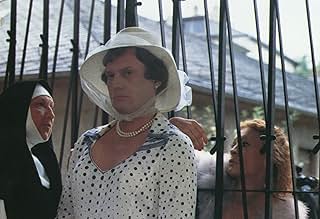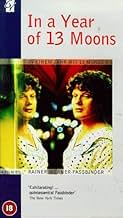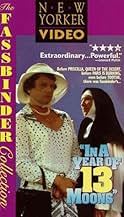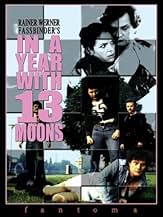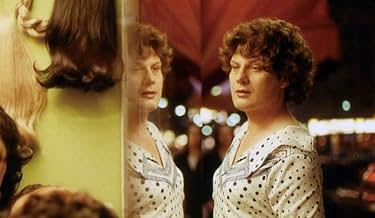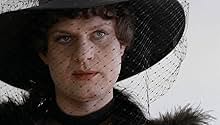AVALIAÇÃO DA IMDb
7,3/10
5 mil
SUA AVALIAÇÃO
Adicionar um enredo no seu idiomaA transgender woman tries to salvage something from the wreckage love has made of her life by confronting her anguished past, hoping to find ultimate acceptance among former acquaintances an... Ler tudoA transgender woman tries to salvage something from the wreckage love has made of her life by confronting her anguished past, hoping to find ultimate acceptance among former acquaintances and herself.A transgender woman tries to salvage something from the wreckage love has made of her life by confronting her anguished past, hoping to find ultimate acceptance among former acquaintances and herself.
- Direção
- Roteirista
- Artistas
- Prêmios
- 1 vitória no total
Lilo Pempeit
- Schwester Gudrun
- (as Lieselotte Pempeit)
Janez Bermez
- Oskar Pleitgen
- (não creditado)
Rainer Werner Fassbinder
- Self
- (cenas de arquivo)
- (não creditado)
Günther Holzapfel
- Angestellter H. H. Brei
- (não creditado)
Ursula Lillig
- Putzfrau
- (não creditado)
Augusto Pinochet
- Self
- (cenas de arquivo)
- (não creditado)
Avaliações em destaque
"In a Year of 13 Moons" is a harrowing and brutal film that explores the themes of identity, human suffering and despair. Fassbinder's films, for the most part, are penetrating glimpses into the human condition at its most vulnerable. I really adore Ingmar Bergman's films, but they are considered "too pessimistic or depressing" for some, but my goodness, Rainer Werner Fassbinder's are bleak as night, often set in an unforgiving, cold and unreceptive world.
The film follows Elvira Weishaupt (Volker Spengler), a troubled and struggling transgender woman, who is wrestling with her identity. Fassbinder would construct the film through a non-linear narrative, that intertwines her many painful memories, her personal encounters, and the many philosophical thoughts and reflections on her life. Considered by many to be one of Fassbinder's most challenging and deeply personal films, and for good reason too. Fassbinder would make "In a Year of 13 Moons" in response to the suicide of his close lover, and this grief added to the intense and turbulent atmosphere that the film carries. The themes of rejection and despair are strong themes that drive the film, along with the search for love, and the pain and devastation of its absence. One of my favorite directors, Richard Linklater, would regard it as his favorite Fassbinder film. It is claustrophobic and very depressing, but for people who enjoy character driven dramas, then you may appreciate it.
The film follows Elvira Weishaupt (Volker Spengler), a troubled and struggling transgender woman, who is wrestling with her identity. Fassbinder would construct the film through a non-linear narrative, that intertwines her many painful memories, her personal encounters, and the many philosophical thoughts and reflections on her life. Considered by many to be one of Fassbinder's most challenging and deeply personal films, and for good reason too. Fassbinder would make "In a Year of 13 Moons" in response to the suicide of his close lover, and this grief added to the intense and turbulent atmosphere that the film carries. The themes of rejection and despair are strong themes that drive the film, along with the search for love, and the pain and devastation of its absence. One of my favorite directors, Richard Linklater, would regard it as his favorite Fassbinder film. It is claustrophobic and very depressing, but for people who enjoy character driven dramas, then you may appreciate it.
In A Year With 13 Moons was directed rather late in director Werner Rainer Fassbinder's career, and in this film you almost get a whiff of life imitating art as you feel like you're watching the last days of Fassbinder as a director. In this film you can see the influence of films that Fassbinder admired, for example, Le Diable probablement, but In A Year With 13 Moons is bleak and impersonal in a way that the aforementioned film is not. It lacks the aesthetic obsession that French films often have and instead there is an emphasis on showing people and places as they truly are.
There are scenes that take place in darkened rooms where you almost get a contrived, science-fiction feel, and you're reminded that in all fiction the process of "world-building" occurs, but it's less obvious in contemporary drama because the viewer/reader is able to associate the names of places and people in the drama with real places and people, so the contrived nature and world-building are neatly tucked under the rug for no one to see. The film is remarkable in its tale of Elvira/Erwin who breaks up with her lover and then has to meet up with an old acquaintance after a misunderstanding. The actors totally inhabit their roles as they generally do in Fassbinder's films and this certainly is a testament to Fassbinder's brilliance as a director.
The primary weakness of this film is that it lacks naturalness and feels just a little too false, in contrast to, for example, Fassbinder's Fox and His Friends, which feels very natural. In A Year With 13 Moons is artsier, somewhat commedia-dell'arte-esque with its stereotypical characters, but after watching so many bad films recently this particular film felt like a breath of fresh air. A notable scene occurs at a butcher site or mechanical abattoir where cattle are being bled and slaughtered, which again was a little reminiscent of the scenes of environmental degradation in Le Diable probablement. In A Year With 13 Moons is a must-see. 8 out of 10.
There are scenes that take place in darkened rooms where you almost get a contrived, science-fiction feel, and you're reminded that in all fiction the process of "world-building" occurs, but it's less obvious in contemporary drama because the viewer/reader is able to associate the names of places and people in the drama with real places and people, so the contrived nature and world-building are neatly tucked under the rug for no one to see. The film is remarkable in its tale of Elvira/Erwin who breaks up with her lover and then has to meet up with an old acquaintance after a misunderstanding. The actors totally inhabit their roles as they generally do in Fassbinder's films and this certainly is a testament to Fassbinder's brilliance as a director.
The primary weakness of this film is that it lacks naturalness and feels just a little too false, in contrast to, for example, Fassbinder's Fox and His Friends, which feels very natural. In A Year With 13 Moons is artsier, somewhat commedia-dell'arte-esque with its stereotypical characters, but after watching so many bad films recently this particular film felt like a breath of fresh air. A notable scene occurs at a butcher site or mechanical abattoir where cattle are being bled and slaughtered, which again was a little reminiscent of the scenes of environmental degradation in Le Diable probablement. In A Year With 13 Moons is a must-see. 8 out of 10.
Many, if not all of Fassbinder's films focus on weighty, emotional issues and characters plunged into personal despair, but none more so than the torturous and overpowering melodrama of In a Year of 13 Moons (1978). Here, Fassbinder created a film that is completely miserable in both tone and content from the first frame until the last; with the director taking the personal loss over the suicide of his lover Armin Meier and turning it into a suffocating chamber piece of pain and humiliation. Like his earlier masterpiece, Fox and his Friends (1975), the film focuses on the personal exploitation and persecution of a sensitive character at the hands of the people that he loves, as he finds himself cast against a cruel backdrop of the grimy and oppressive homosexual sub-culture of 1970's Frankfurt. However, unlike Fox and his Friends, the spirit of Meier's death and the guilt that we assume Fassbinder was suffering from at the time of the film's conception have here removed any prevailing notion of hope or the promise of escape that hung-over the character of Franz - the lottery winning carnival worker from the aforementioned "Fox", as he sought an end to his cruel suffering - and replaced it with a continually degrading emphasis on shame and deprivation.
Fassbinder establishes the pitiless tone of the film right from the start, with an opening vignette showing our central character, dowdy transsexual Elvira Weishaupt, dressed as a man and wandering through a park in the early hours of the morning looking for trade. After successfully managing to hook-up with a suitably butch male-prostitute, her secret is soon discovered and the 'john', alongside a couple of similarly macho friends, beat and mock Elvira, leaving her as a shivering, crying wreck, half-naked on an disused train-track. From here, Elvira limps home to her cramped apartment only to be plunged into a torturous, violent argument with her ex-boyfriend, which again, leaves her used and humiliated. The film continues in this episodic approach as we follow Elvira over the course of a few days and eventually find out more about her true character and personality and the events in her life that led to the eventual creation of the person that she is when we first discover her. These events are no less cruel and humiliating to the character of Elvira - who has clearly made a number of mistakes, either as a result of naiveté, arrogance or blind stupidity - as we discover the process that turned a handsome young man with a wife and infant daughter into an overweight, alcoholic wreck, abused and betrayed by the various men in her life, and the social pariahs that hang on the periphery.
As ever with Fassbinder, the presentation of the film underpins the feelings of the character and the world that she inhabits perfectly; with the cramped spaces of her apartment made even more prison-like and oppressive by the director's claustrophobic use of staging, design and composition. Fassbinder undertook the role of cinematographer himself here and shot the film on grainy 16mm, which again, adds to the stark and colourless feeling that the film conveys. The ugliness of the cinematography, with its dimly lit rooms, fragment composition and awkward camera movements could be seen as either amateurish on the part of the filmmaker, or as a deliberate attempt to distance the viewer from the characters and the emotional subtext in a manner that is reminiscent of Brecht; or, more appropriately, Godard's cinematic appropriation of Brecht and his theatre of alienation. As with the subsequent political satire, The Third Generation (1979) - once again, shot by Fassbinder himself - the unconventional approach to cinematography is combined with further elements that attempt to similarly disarm us and make the process of viewing the film as difficult as possible. The opening scene itself is emblematic of this approach, with Fassbinder obscuring the frame with large titles and an opening text that scrolls slowly over the entire frame before continuing with his use of obscured images and fragmented mise-en-scene.
Fassbinder also uses jarring cuts, with scenes seemingly beginning during the middle of a conversation or after the context of the scene has already been established, whilst sound and the disorientating way in which the director has characters talking over one another while music plays disconcertingly in the background all continue this idea of deconstruction and emotional distraction. The ugliness of the film fits perfectly with its tone; with the legendary scene in which Elvira and her friend wander ghost-like through an actual slaughterhouse, where cows are dispatched in graphic detail, whilst a monologue is recited to give us the entire back-story of this truly tragic figure. Whether or not Elvira is an extension of Fassbinder or the personification of Armin Meier is unknown, though there is certainly that element to the interpretation. I'd imagine that there is also some of the director in the portrayal of manipulative antagonist Anton Saitz, who recalls the depiction of Fassbinder in the director's own segment of Germany in Autumn (1978). Regardless, In a Year of 13 Moons is a fascinating if entirely difficult work from Fassbinder; one that brims with an uncomfortable feeling of personal confession and searing self examination that is grotesque, repellent and utterly draining, whilst also standing as a powerful and passionately realised piece of work that is both remarkable and affecting.
Fassbinder establishes the pitiless tone of the film right from the start, with an opening vignette showing our central character, dowdy transsexual Elvira Weishaupt, dressed as a man and wandering through a park in the early hours of the morning looking for trade. After successfully managing to hook-up with a suitably butch male-prostitute, her secret is soon discovered and the 'john', alongside a couple of similarly macho friends, beat and mock Elvira, leaving her as a shivering, crying wreck, half-naked on an disused train-track. From here, Elvira limps home to her cramped apartment only to be plunged into a torturous, violent argument with her ex-boyfriend, which again, leaves her used and humiliated. The film continues in this episodic approach as we follow Elvira over the course of a few days and eventually find out more about her true character and personality and the events in her life that led to the eventual creation of the person that she is when we first discover her. These events are no less cruel and humiliating to the character of Elvira - who has clearly made a number of mistakes, either as a result of naiveté, arrogance or blind stupidity - as we discover the process that turned a handsome young man with a wife and infant daughter into an overweight, alcoholic wreck, abused and betrayed by the various men in her life, and the social pariahs that hang on the periphery.
As ever with Fassbinder, the presentation of the film underpins the feelings of the character and the world that she inhabits perfectly; with the cramped spaces of her apartment made even more prison-like and oppressive by the director's claustrophobic use of staging, design and composition. Fassbinder undertook the role of cinematographer himself here and shot the film on grainy 16mm, which again, adds to the stark and colourless feeling that the film conveys. The ugliness of the cinematography, with its dimly lit rooms, fragment composition and awkward camera movements could be seen as either amateurish on the part of the filmmaker, or as a deliberate attempt to distance the viewer from the characters and the emotional subtext in a manner that is reminiscent of Brecht; or, more appropriately, Godard's cinematic appropriation of Brecht and his theatre of alienation. As with the subsequent political satire, The Third Generation (1979) - once again, shot by Fassbinder himself - the unconventional approach to cinematography is combined with further elements that attempt to similarly disarm us and make the process of viewing the film as difficult as possible. The opening scene itself is emblematic of this approach, with Fassbinder obscuring the frame with large titles and an opening text that scrolls slowly over the entire frame before continuing with his use of obscured images and fragmented mise-en-scene.
Fassbinder also uses jarring cuts, with scenes seemingly beginning during the middle of a conversation or after the context of the scene has already been established, whilst sound and the disorientating way in which the director has characters talking over one another while music plays disconcertingly in the background all continue this idea of deconstruction and emotional distraction. The ugliness of the film fits perfectly with its tone; with the legendary scene in which Elvira and her friend wander ghost-like through an actual slaughterhouse, where cows are dispatched in graphic detail, whilst a monologue is recited to give us the entire back-story of this truly tragic figure. Whether or not Elvira is an extension of Fassbinder or the personification of Armin Meier is unknown, though there is certainly that element to the interpretation. I'd imagine that there is also some of the director in the portrayal of manipulative antagonist Anton Saitz, who recalls the depiction of Fassbinder in the director's own segment of Germany in Autumn (1978). Regardless, In a Year of 13 Moons is a fascinating if entirely difficult work from Fassbinder; one that brims with an uncomfortable feeling of personal confession and searing self examination that is grotesque, repellent and utterly draining, whilst also standing as a powerful and passionately realised piece of work that is both remarkable and affecting.
I watched this movie and after my first reaction wasn't that clear. sometimes boring perhaps? but then i was thinking about it, more and more and it touched me more and more and in a strange way i compared this one with the all time classic x-mas movie IT'S A WONDERFUL LIFE from Capra. in the mood way. Interesting to say, that also in 13 MOONS there is an angel like in the x-mas Movie. It's the character ROTE ZORA. While Capra's angel had success, it's will know, it will not happen in 13 Moons.
of course while you will learn by the Frank Capra movie how important each human being is in the world we live in, Fassbinder gives you here the lesson how hopeless life can be. So while you have tears in your eyes by watching IT'S A WONDERFUL LIFE, you see all the hope in this movie and you know there will be a happy end. From the first second on in this movie you know, there will be no happy end. And you will have no tears in your eyes at the end, but perhaps you will be a little bit speechless. From Hollywood a movie like this never will come. This movie don't want to entertain you in a Hollywood way. so be prepared!
This movie is the most personal Fasssbinder for sure. He lost some weeks before his boyfriend. then he wrote in three days the whole script. Unbelievable to tell that he ALSO was responsible for BOOK/EDITING/CAMERA (Michael Ballhaus was asked for, but he couldn't)/PRODUCING/IDEA/EQUIPMENT and of course DIRECTING it. The Music score is very good (classic meets suicide (the new wave band) meets sixties rock'n roll meets Connie Francis). A terrific Volker Spengler as the main character as also a stunning Ingrid Caven.
Almost impossible to understand the whole plot when you have to read the English subtitles, it's absolutely recommend when you can speak German.
Beginning with the written introduction about the 13 Moons, through the slaughterhouse scene (which is remarkable for the whole movie, because here he shows us the Life and the Death, the hopeless the movie is about in a short sequence), through the next scene where elvira is lying very depressed on the bed while the record player plays a x-mas song (it's a wonderful life......), but the song has a scratch (hopeless again) to the important scene where elvira tries to become erwin again (but failed), the two hours of this movie is very sensitive. It's not a movie to watch between Forrest Gump and Star Wars (...). It's a movie which brings you back to the ground of earth. So honest that you feel pain.
Everyone will have a time in life in which he falls in a hole. This movie is showing that. A tragedy. OR a horror trip.
of course while you will learn by the Frank Capra movie how important each human being is in the world we live in, Fassbinder gives you here the lesson how hopeless life can be. So while you have tears in your eyes by watching IT'S A WONDERFUL LIFE, you see all the hope in this movie and you know there will be a happy end. From the first second on in this movie you know, there will be no happy end. And you will have no tears in your eyes at the end, but perhaps you will be a little bit speechless. From Hollywood a movie like this never will come. This movie don't want to entertain you in a Hollywood way. so be prepared!
This movie is the most personal Fasssbinder for sure. He lost some weeks before his boyfriend. then he wrote in three days the whole script. Unbelievable to tell that he ALSO was responsible for BOOK/EDITING/CAMERA (Michael Ballhaus was asked for, but he couldn't)/PRODUCING/IDEA/EQUIPMENT and of course DIRECTING it. The Music score is very good (classic meets suicide (the new wave band) meets sixties rock'n roll meets Connie Francis). A terrific Volker Spengler as the main character as also a stunning Ingrid Caven.
Almost impossible to understand the whole plot when you have to read the English subtitles, it's absolutely recommend when you can speak German.
Beginning with the written introduction about the 13 Moons, through the slaughterhouse scene (which is remarkable for the whole movie, because here he shows us the Life and the Death, the hopeless the movie is about in a short sequence), through the next scene where elvira is lying very depressed on the bed while the record player plays a x-mas song (it's a wonderful life......), but the song has a scratch (hopeless again) to the important scene where elvira tries to become erwin again (but failed), the two hours of this movie is very sensitive. It's not a movie to watch between Forrest Gump and Star Wars (...). It's a movie which brings you back to the ground of earth. So honest that you feel pain.
Everyone will have a time in life in which he falls in a hole. This movie is showing that. A tragedy. OR a horror trip.
This drama follows the last few days in the life of Elvira (formerly Erwin) Weisshaupt. Years before, Erwin told a co-worker, Anton, that he loved him. "Too bad, you aren't a woman," he replied. Erwin took Anton at his word. Trying to salvage something from the wreckage love has made of his life, he now hopes that Anton will not reject him again.
At this point (2017), I have seen most of what Fassbinder has made. And, indeed, the vast majority is really good. Some have said this is his best work. While I am not sure I am ready to jump on that train, I am also not willing to deny the possibility. Even the content alone deserves praise. This is 1978. I am no expert on transgender history, but I cannot think of any films that tackled such a heavy subject this far back.
If anything, the film seems even more topical today as transgender issues are more front and center. The mainstream is ready to stand up for the rights of these folks, and films like "13 Moons" should really be re-examined by the film community.
At this point (2017), I have seen most of what Fassbinder has made. And, indeed, the vast majority is really good. Some have said this is his best work. While I am not sure I am ready to jump on that train, I am also not willing to deny the possibility. Even the content alone deserves praise. This is 1978. I am no expert on transgender history, but I cannot think of any films that tackled such a heavy subject this far back.
If anything, the film seems even more topical today as transgender issues are more front and center. The mainstream is ready to stand up for the rights of these folks, and films like "13 Moons" should really be re-examined by the film community.
Você sabia?
- CuriosidadesThe tape-recorded narration heard throughout the film (particularly during the final scene) was not scripted. Volker Spengler (playing Elvira Weishaupt) and Rainer Werner Fassbinder recorded the narration together, with Fassbinder asking questions and Spengler responding in character. In the final cut of the film, Fassbinder's voice is edited out.
- Trilhas sonorasSchöner fremder Mann
Music and Words by Athena Hosey and Hal Gordon and German lyrics by Camillo Felgen
Performed by Connie Francis
Principais escolhas
Faça login para avaliar e ver a lista de recomendações personalizadas
- How long is In a Year with 13 Moons?Fornecido pela Alexa
Detalhes
- Data de lançamento
- País de origem
- Idioma
- Também conhecido como
- In a Year with 13 Moons
- Locações de filme
- Empresas de produção
- Consulte mais créditos da empresa na IMDbPro
Bilheteria
- Orçamento
- DEM 700.000 (estimativa)
- Tempo de duração2 horas 4 minutos
- Mixagem de som
- Proporção
- 1.66 : 1
Contribua para esta página
Sugerir uma alteração ou adicionar conteúdo ausente

Principal brecha
By what name was Num Ano de 13 Luas (1978) officially released in India in English?
Responda
